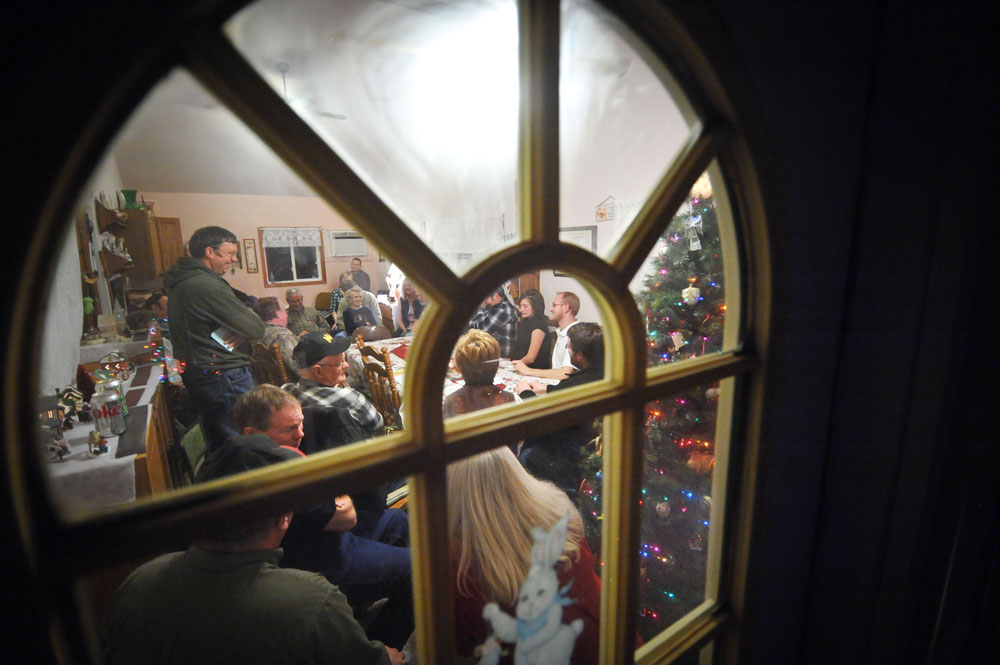
Voters debate during a caucus of precinct 42 near Smithland, Iowa, Tuesday, Jan. 3, 2012. AP Photo
I am a fervent Ohio State football fan so I generally care about Iowa once a year – when playing the Hawkeyes means adding another “W” to the win column. As a Political Scientist though, vocation demands that every four years my analytic attention turns toward Iowa and the presidential caucuses. With the Iowa caucuses commencing this evening, I will not be alone.
But why Iowa? Iowans understandably enjoy the voice, money spent, and attention that being the first state to officially weigh-in on the presidential contest brings. And, let’s be honest, it also helps them disassociate from Bachelor Chris in the public mind. But amongst political scientists, journalists, and much of the American public a regular critique is that Iowa is simply too unrepresentative to wield such influence over who will be the nominees of the Democratic and Republican parties. As Kevin McDermott succinctly penned, Iowa voters are “mostly white, largely rural, and older than the national norm.” And they are. Iowa is unrepresentative of the United States and Iowa caucus goers are even more divorced from the American populace.
And that’s exactly why Iowa is actually representative of our unrepresentative American electoral politics. Iowa is the American election process on speed (if speed was made from ethanol). Just look to the evidence:
- Money Talks. And It Only Talks to Certain States. Over seventy million dollars has been spent in Iowa on political ads in this cycle alone. That is about $22 per Iowan. In the general election, citizens of states like Colorado, Ohio, and Florida will have far more spent on them by the eventual party nominees than those of us in solidly blue or red states. The Electoral College means a select few states get spent heavily on and some citizens are reached out to over-and-over by party nominees while others are ignored. Iowa only kicks off this trend. The general election solidifies it.
- Too White. The single best predictor of whether or not one votes in the United States is socio-economic status. This truism of political science holds across the modern era. The more affluent exercise disproportionate voice in American politics. And, given the patterns of structural racism and inequity in the United States, income and wealth inequality is both dramatic and increasing between whites and African-Americans, Native-American, and Hispanics. All this means that voters are disproportionately white. Add to this, as Brennan Center for Justice reports, that “from early 2011 until the 2012 election, state lawmakers across the country introduced at least 180 restrictive voting bills in 41 states.” Changes like requiring voter ids disproportionately keep African-Americans and Hispanics from the polls. So Iowa is too white to be playing such a big role in Presidential politics you say? Solid point. So is American electioneering writ large.
- Undue Interest Group Influence. Ethanol! Iowa and their ethanol. There is a reason I did not major in chemistry. Or farming. Or whatever discipline governs the classification of ethanol. But I do know quite a bit about electoral politics. We can try and shame the farming industry in Iowa who has used their early influence to garner considerable federal subsidies for ethanol and even made sure it is mixed in gasoline. Being first to caucus in the Presidential race is an awfully nice way to keep this gravy train running. So we should be enraged by this inefficient farce, correct? Spare me. Ethanol is cute compared to the undue policy and electoral influence the NRA, Planned Parenthood, Wall Street, unions, Big Tobacco, Goldman Sachs, and others will have given their spending in the 2016 general contest. Here again, Iowa offers but a glimpse of what is to come post-conventions.
- What Electoral Connection? Love ‘em and Leave ‘em. Anger is the word of the day in Presidential politics. It seems to be motivating much of Trump’s rise and it, combined with disenchantment, has the Bernie crowd motivated and polling within the margin of error of HRC in Iowa. As many a Christian evangelical will tell you, and ardent environmentalist will reaffirm, folks are sick of being wooed during the presidential contests by their respective party and then back-burnered once governing. Iowa but amplifies this trend. See ya again in 3ish years, Hawkeyes! Come this evening, every candidate and news crew is outta Iowa. So the disconnect between electioneering and policymaking for ideological extreme members of the base is mirrored in the most stark terms in Iowa.
- Arcane Rules Deplete Turnout. WTF is a caucus? And why does the Republican caucus in Iowa so differ from the Democratic one? Why are precincts counted equally? What time is it again? Who gives the speeches? Iowa’s process is confusing. But it has nothing on the conglomeration of different laws, times, eligibility standards, and other offices on the ballot that will play out across the U.S. come November 2016. Turnout in American general elections contests is abysmal compared to other advanced democracies and this confusing mix of registration and electoral practices is a major reason why. The Iowa caucus first only puts this absurdity on further display. In 2012, just under 20% of eligible Iowa republicans caucused. In that same year, but 58.2% of eligible Americans voted. So don’t mock the caucus. Mock byzantine American elections procedures and how they keep folks from the polls.
So, yeah, having Iowa vote first for President is odd. Just like American Presidential elections. As you watch the returns this evening, and are potentially driven to drink, remember Iowa is but the canary in the coal mine for our deeply unrepresentative American Presidential election process.

